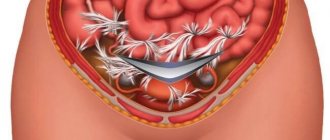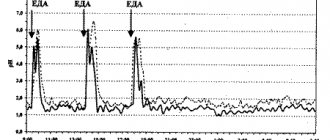One of the histological variants of gastric cancer is mucinous carcinoma. It accounts for about 9-15% of all adenocarcinomas and is characterized by relatively rapid progression without timely treatment.
- general information
- Causes and risk factors
- Clinical picture
- Spreading into neighboring organs and metastasis
- Diagnostics
- Treatment tactics
According to the International Agency for Research on Cancer (IARC), gastric cancer ranks fourth in prevalence among all cancer pathologies, and second in mortality. This statistics is largely due to the lack of oncological alertness among patients and doctors, which leads to late diagnosis of the disease. In the CIS countries, there is a high incidence of stomach cancer, and at the same time, late detection of malignant neoplasms.
Functions of mucus in the stomach
Since our birth, special cells have been producing mucus in the stomach. The reason is that the substance is needed in this organ. Mucus, or mucin, is produced into bicarbonate. The resulting mucus-bicarbonate barrier protects the stomach tissue itself. This is the main function of the mucous membrane.
Mucus protects our body not only from gastric juice, but also from what we eat. Poor nutrition, diets, as well as overeating are all harmful. In addition, the gastric tract is not designed for rough food and cigarette smoke. All these shocks gradually destroy the protective shell, and the body is forced to develop protective mechanisms.
Causes and risk factors
According to modern concepts, mucous cancer is a polyetiological disease associated with a number of external and internal causes. Among endogenous risk factors, special attention is paid to changes in the functional state of the stomach. As a rule, cancer does not appear suddenly on a healthy mucous membrane; the appearance of malignant neoplasms is preceded by a number of diseases that are classified as background or precancerous:
- chronic gastritis with high or low acidity;
- polyps and other benign neoplasms;
- history of stomach ulcers.
Among the exogenous factors in the mechanism of development of malignant neoplasms, carcinogens play a role, including food, bad habits, exposure to ionizing radiation, and viruses (for example, the Epstein-Barr virus).
Excess mucus in the stomach. Causes
The layer of mucin proteins increases when we neglect nutritional rules. The main reasons are as follows:
- frequent overeating, high-calorie and fatty foods in the diet;
- stress, depression;
- alcohol consumption;
- smoking;
- for some, long periods of fasting are key;
- dry snacks;
- fatty foods daily.
When gastric juice is actively secreted, food must be supplied in the required quantity. If you force yourself to diet, the hydrochloric acid in your stomach eats away at the protective lining and leads to ulcers. If there are also Helicobacter bacteria in the stomach, the destruction of protective mechanisms is aggravated. However, some people tolerate hunger quite well. This depends, perhaps, on the physiological characteristics of the organism itself.
Consequences
Any pathology in physiology has its consequences. If the volume of mucus increases, then:
- Acidity is noticeably reduced. Food in the stomach is poorly digested and begins to rot and ferment.
- Because food simply rots and passes undigested into the intestines, many nutrients are not absorbed.
- The body quickly depletes, a person loses weight for no reason.
- Bacteria develop in the stomach cavity and peptic ulcers begin to form, which cause pain.
It should be noted that the more mucus on the walls of the stomach, the less acidity, therefore, the worse food is digested.
Signs of excess mucus
We found out that there should not be a lot of mucus in the stomach, its layer should not exceed the specified intervals. It is bad when there is a lot of mucus in the stomach - the reasons and consequences are clear. Now let's look at how to detect these problems.
A person suffering from pathology will exhibit the following symptoms:
- aching pain in the stomach and sometimes in the intestines;
- sudden weight loss due to gradual atrophy of the glands that produce gastric juice;
- bloating and belching;
- constipation;
- on the mental side - sudden mood swings, irritability.
To understand the reasons for the appearance of the above symptoms, you need to be examined by a gastroenterologist.
Spreading into neighboring organs and metastasis
The transition of mucous gastric cancer to nearby anatomical structures occurs in the later stages, when the tumor grows into all layers of the stomach. Symptoms that appear when a malignant tumor spreads to neighboring organs are late manifestations of the disease.
Thus, when the pancreas is damaged, the nature of the pain syndrome changes dramatically. The pain becomes severe, is difficult to tolerate by patients and has a girdling character. They can radiate to the back, scapula and interscapular space. A similar pain syndrome appears when the small and transverse colon are involved in the oncological process. If the peritoneum (a sheet of connective tissue surrounding the abdominal organs) is affected, the pain may be diffuse.
Symptoms of damage to neighboring organs also include:
- obstructive jaundice (pancreas);
- colonic obstruction and the formation of a pathological anastomosis - a fistula between the stomach and a section of the large intestine (transverse colon);
- protective tension of the muscles of the anterior abdominal wall (peritoneum);
- ascites (portal vein).
Metastases in mucosal gastric cancer are relatively common. Lymphogenic metastasis occurs along the lymphatic pathways towards the porta hepatis, along the greater omentum to the spleen, along the gastropancreatic ligament and to the tissue around the pancreas. Groups of lymph nodes affected by metastases require removal.
Distant metastasis in gastric cancer can occur both lymphogenously and hematogenously - through the blood. In this case, the retroperitoneal, inguinal, axillary and mediastinal groups of lymph nodes can be affected. The most common distant lymphogenous metastases are Virchow metastases (in the supraclavicular nodes) and Krukenberg metastases (in the ovaries).
Another route of metastasis is implantation. It involves contact transfer of tumor cells. Usually, by implantation, the tumor process spreads to the peritoneum in the form of small tumor nodules - peritoneal carcinomatosis. Along the greater omentum, cancer cells can also spread to the pelvic organs with the formation of metastases in the recto-vaginal and rect-vesical folds - Schnitzler metastases.
Metastasis of gastric mucosal cancer to other organs is represented by damage to the liver, pancreas, and lungs. Less commonly, bones are affected, including the thoracic vertebrae, skin and subcutaneous fat.
Mucus on an empty stomach
If a clear excess of mucin is visible during gastroscopy in the morning, after a prescribed long-term abstinence from food, it means that there are already some disorders in the body. It is advisable to check other organs - the pancreas, gallbladder and duodenum. Inflammation of these organs also increases mucin production.
What explains the appearance of mucus in the stomach on an empty stomach? The reasons for this may lie in the habit of smoking on an empty stomach. Smoking severely damages the mucous membranes of both the esophagus and stomach. The body somehow tries to cope with this and produces more mucins than necessary.
Treatment of excess mucus
Eliminating the symptoms of esophagitis will not get rid of the problem itself. The lack of proper treatment is fraught with aggravation of the condition and serious digestive problems. Removing mucin by washing is a temporary therapy. An integrated approach to removing sputum is needed, but first it is worth conducting a full examination, collecting the necessary tests and finding out why there is a lot of mucus in the esophagus.
Before starting treatment, the doctor strongly advises the patient to change their usual lifestyle, review their diet, and get rid of bad habits. The minimum amount of liquid you drink per day should be 1.5-2 liters per day. It is also necessary to exclude physical activity associated with bending the body and lifting weights.
The formation of sputum in the throat is the result of sinusitis, pharyngitis, bronchitis and is treated with antibacterial drugs. Mucolytic drugs help thin mucus throughout the esophagus and stomach. Allergic reactions with the appearance of mucus are treated with antihistamines, as well as by protecting the patient from the irritating factor.
Mucolytics help thin mucus throughout the esophagus and stomach
Traditional medicine to treat mucus in the esophagus
Drug treatment is prescribed based on the nature of the disease that causes the increase in mucin production. Medicines are conventionally divided into groups:
- Antiviral - used for acute respiratory diseases and influenza;
- Antibiotics - will remove infection caused by bacteria;
- Anti-inflammatory - reduce body temperature, relieve inflammation and pain. Corticosteroid medications are prescribed for severe forms of the disease;
- Antispasmodics - remove the increased tone of the smooth muscles of the gastrointestinal tract;
- Enzymes are enzyme preparations that improve intestinal motility and food digestion;
- Antacids - reduce stomach acidity.
There is a certain treatment regimen for esophagitis, which helps to quickly get rid of the disease and remove mucus that interferes with swallowing, digesting food and causing general malaise for the patient. Pharyngitis is treated by washing the nasal sinuses with an aerosol, irrigating the pharynx with Ingalipt or Orasept, and lubricating the throat with Lugol. The prescribed tablets are “Grammidin”, “Falimint”, “Travisil”. An effective remedy is rinsing with a solution of alkali, salt and antiseptic.
With sinusitis and rhinitis, snot appears, making it difficult to swallow. Treatment is carried out using vasoconstrictor drops or sprays: “Naphthyzin”, “Avamys”, “Xilen”. Drops are not recommended for use for more than 5 days. In parallel, saline solutions for washing “Aquamaris” and “Aqualor” are used.
Pneumonia and bronchitis are treated with expectorant drugs that help thin mucus and stimulate its excretion. To relieve spasms, bronchodilators "Eufillin", "Metacin", and corticosteroid drugs - "Hydrocortisone", "Triamycinolone" - are taken. Physiotherapy, chest massage, and gymnastic exercises are also prescribed.
A mucous lump in the throat can be removed with a solution of table salt
How to remove mucus from the esophagus using traditional medicine
The combined use of traditional and folk therapy can bring good results in a short time. Home treatment includes many effective ways to get rid of phlegm.
- A mucous lump in the throat can be removed with a solution of table salt. In 1 liter of liquid, dilute 1 tbsp. l. salt. In the morning, 1-1.5 hours after eating, the resulting solution is drunk in small sips for 10 minutes. As a rule, after taking it, vomiting begins, releasing a lot of mucus. The procedure lasts up to 5 days, after which the emerging liquid should become transparent, without mucin admixture.
- Infusion of ginger root. Chopped ginger (a small root) is poured with boiling water (1 liter) and left for one hour. The liquid is drunk throughout the day. If you don't like the taste of ginger, you can improve the taste by adding honey.
- Juices from citrus fruits, cabbage, horseradish. Take the mixture or separately twice a day, a teaspoon.
- Chamomile and St. John's wort cleanse and disinfect the stomach. 1 s each. l. pour a liter of boiling water over each of the herbs and leave for 15-20 minutes. Drink 0.5 cups on an empty stomach during the day.
Mucus and bile in the stomach. Gastroesophageal reflux
Why do bile and mucus accumulate in the stomach? The cause is usually gastroesophageal reflux. It happens that bile is detected in the stomach cavity during gastroscopy. Its one-time reflux from the duodenum into the stomach is not a dangerous problem. Reflux, that is, the reflux of bile, is diagnosed when the sphincter at the pylorus does not close well and constantly allows bile secreted by the liver into the stomach.
If, in addition, the mucin layer is greater than 1.5 mm, it becomes increasingly difficult for the stomach to digest food. Ulcers form quickly, since bile should not enter the pylorus of the stomach - this substance is destructive to the tissues of the organ.
Signs of bile reflux into the stomach are:
- heartburn;
- belching with a strong bitter taste;
- yellow coating on the tongue, early in the morning this very unpleasant coating and bilious taste are felt.
- bad breath.
In advanced cases, nausea after eating and vomiting with bile are often bothersome.
Diagnostics
Of great importance in diagnosing the disease is a conversation with the patient, a thorough collection of anamnesis and complaints, as well as a clinical examination. Already at this stage, the doctor may become suspicious of cancer. In the early stages of cancer, data from a general examination of the patient are scarce. In advanced cases, attention is drawn to the patient's exhaustion, dry skin, and slight jaundice of the sclera. If the tumor is large, it can be palpated through the anterior abdominal wall.
Laboratory and instrumental diagnostic methods include:
- blood, urine and stool tests;
- X-ray of the stomach - contrast examination of the stomach cavity;
- cytological examination of gastric lavage;
- gastroscopy - endoscopic visualization of the gastric mucosa and biopsy of suspicious areas;
- Ultrasound examination of the abdominal and pelvic organs;
- computed and magnetic resonance imaging;
- determination of cancer markers in blood serum.
The scope of the diagnostic program is determined individually. Additional studies for suspected gastric mucosal cancer include radioisotope diagnostics, laparoscopic intervention, and endoscopic ultrasound.
Mucus in the gastrointestinal tract in a child
The viscous substance in the stomach, or mucin, negatively affects digestion, especially in childhood. Why does mucus accumulate in a child's stomach? The cause is excessive consumption of buns, sweets, street food, as well as the habit of eating fried and fatty foods at night. After all, at night the production of gastric juice stops; all food eaten late in the evening wanders into the gastrointestinal tract and is not digested. This applies to both children and adults.
However, this stomach condition is very dangerous for a child. It can quickly develop into other serious pathologies, and most importantly, it prevents the child’s body from developing. Due to problems with food digestion, many substances are poorly absorbed in the intestines, and it is extremely important for a growing body to receive as many vitamins and microelements as possible.
Clinical picture
For a long time, the disease can be asymptomatic or with minimal clinical manifestations. In the early stages of gastric mucosal cancer, some patients may experience pain in the epigastric region. The pain is accompanied by unpleasant symptoms such as a feeling of heaviness and fullness, belching and nausea. The listed symptoms are usually unstable and go away on their own or can be treated with medications.
Subsequently, symptoms continue to increase in duration and severity. Common manifestations of stomach cancer are called “small sign syndrome.” These include:
- persistent decrease in appetite and its perversion (complete refusal of meat products, aversion to any food);
- loss of the ability to enjoy the taste of food;
- a feeling of distension and fullness of the stomach with gases or food eaten;
- rapidly progressive loss of body weight up to cachexia (exhaustion);
- loss of interest in surrounding things and phenomena, alienation and apathy;
- weakness and low performance.
The listed symptoms are not specific to oncological processes and can occur in a number of other diseases.
Among the signs that indicate damage to the stomach are belching of air or eaten food, vomiting, severe constant pain in the epigastrium, independent of food intake. Belching and vomiting are a consequence of stagnation of food masses due to narrowing of the lumen of the stomach. Most often they appear when mucous cancer is localized in the cardiac and antral regions.
In rare cases (less than 5%), a completely asymptomatic course of the disease up to the terminal stages is possible.
Timely gastroscopy
Gastroscopy is prescribed for anyone who complains of stomach pain and difficulty digesting food. Before the procedure, you must abstain from food for 8 hours. If a person smokes, you will need to wait about 3 hours without cigarettes until gastroscopy.
Excess mucus is immediately noticeable on the device screen, and the doctor will tell you about the high risks of developing pathology. But when atrophic gastritis is already present, which is often detected against the background of excess mucus, it is very likely that the next stage will be tissue degeneration. The glandular cells of the epithelium are replaced by another, more dense and “hardy” tissue. And this is Barrett’s disease, which is recognized by doctors around the world as a harbinger of stomach cancer.
Hypertrophic or atrophic gastritis are very scary diagnoses. In this case, you need to stop smoking immediately and gradually accustom yourself to healthy foods. It is important to find out the reasons for the formation of mucus in the stomach and begin treatment.
Why does snot run down the back of the throat?
The pathology accompanies a number of ENT diseases. Possible reasons why snot runs down the back of the throat are:
- proliferation of adenoids;
- congenital anomalies of the structure of the mucous membrane of the posterior wall of the nasopharynx;
- deviated nasal septum;
- rhinosinusitis of various etiologies accounts for more than 50% of identified clinical cases;
- entry of a foreign body into the nasal cavity.
Women may experience the appearance of snot in the throat during pregnancy. A similar situation arises for people who work in hazardous industries or live in regions with poor ecology, or smokers. Chemical fumes, tobacco smoke, and particles of household chemicals entering the respiratory tract lead to irritation of the mucous membrane, so mucus production increases and snot flows into the throat.
The problem of leakage appears when taking certain medications. In particular, such a situation may be associated with the uncontrolled use of vasoconstrictor nasal drops. While the patient is using these medications, postnasal drip of mucus is observed. After discontinuation of the drug, mucus production normalizes and unpleasant symptoms disappear.
Some people experience snot running down their throats when the temperature and humidity change. When the microclimate is normalized, the human condition improves.
In some cases, the appearance of postnasal drip in adults and children is in no way associated with ENT diseases. The cause is pathology of the digestive organs, which is accompanied by gastroesophageal reflux. The contents of the stomach are regularly thrown into the esophagus, which causes belching, sore throat, and irritation of the mucous membrane. For this reason, mucus production increases and postnasal drip appears.
In some patients, this symptom is accompanied by endocrine pathologies leading to hormonal imbalance.
Barrett's disease
Barrett's disease developing as a result of atrophic gastritis indicates a precancerous condition. And gastritis with low acidity is often provoked by excess mucus. To prevent such serious diseases, you need to go to the doctor at the first sign: pain in the epigastric region or sudden constipation, belching with a sour or bitter taste. Therefore, you need to know that mucus in the stomach (we have listed the reasons for its formation) is not a harmless anomaly, but a dangerous harbinger of many gastrointestinal diseases.
Medical treatment
The main thing in therapy is to detect in time that there is a lot of mucus in the stomach. Causes and treatment - all these questions should be discussed with your doctor. To treat such a pathology, drugs are needed that are an analogue of stomach acid - hydrochloric acids, which destroy mucus naturally, as a result of which it will be removed from the body.
If there are other concomitant stomach diseases (ulcers, for example), the gastroenterologist will additionally prescribe suitable medications. If your acidity is low, it is better to drink herbal infusions, and if your acidity is high, take Omeprazole or other medications in this group. All treatment is selected individually, and only during an appointment with a doctor. A pharmacy employee does not have the right to recommend medications at his own discretion.
Diet
Treatment without changing dietary principles is practically useless when it comes to stomach problems. It is important to plan meals so that no more than 4 hours pass between them. Foods like hamburgers or French fries are absolutely useless, only harmful and contribute to obesity. Therefore, with the first signs of gastritis, you should give up the habit of eating street food.
Let's get back to the main thing. What should you remove from your diet?
- Milk porridge in the morning.
- Potatoes - no matter how cooked, any potato dishes contain a lot of starch and increase mucus.
- All flour dishes, especially baked goods.
- Alcohol and coffee. They strongly irritate the mucous membranes and cause a protective reaction in the body.
- Fried, smoked, fatty foods.
Useful products, that is, those that reduce the mucin layer, are:
- millet, barley and dietary buckwheat;
- vegetables - cauliflower, carrots, asparagus, beets, celery.
Vegetables contain fiber, so they are digested properly and quickly. In the diet, instead of animal fats, it is better to use raw vegetable fats - olive, flaxseed, sunflower oils. It is useful to introduce nuts and seeds into your daily diet.
Excess mucus in the stomach can be eliminated naturally, without drugs, if you start eating raw vegetables in the morning, get by with one piece of fish during the day, and eat boiled vegetable dishes in the evenings.
Treatment of snot in the throat in an adult
Postnasal drip syndrome affects people of all ages. To find out how to get rid of snot in the throat, an adult patient also needs to consult an ENT doctor. The specialist will prescribe a set of examinations to identify the cause of the pathology and appropriate treatment.
What to do if the snot in the throat does not go away after taking medications? This situation may be caused by incorrectly selected therapy or structural abnormalities of the intranasal structures and paranasal sinuses. In this case, the doctor may choose a different conservative therapy regimen or recommend surgical treatment.
Patients with a deviated nasal septum undergo septoplasty. This is an endoscopic operation that is aimed at eliminating deformation of the nasal septum without changing the shape of the external nose. Thanks to this procedure, nasal breathing is restored and one of the main causes of rhinitis and sinusitis, which provoke postnasal drip, is eliminated.
If there are indications, the patient may undergo surgery to resect concha bullosa or remove a Thornwaldt cyst, a cyst-like formation in the nasopharynx. It causes postnasal drip, which is difficult to respond to conservative therapy. After the operation, the patient's condition usually returns to normal.
Without an examination, it is impossible to say how to treat snot in the throat, so this situation requires mandatory attention from specialists.










